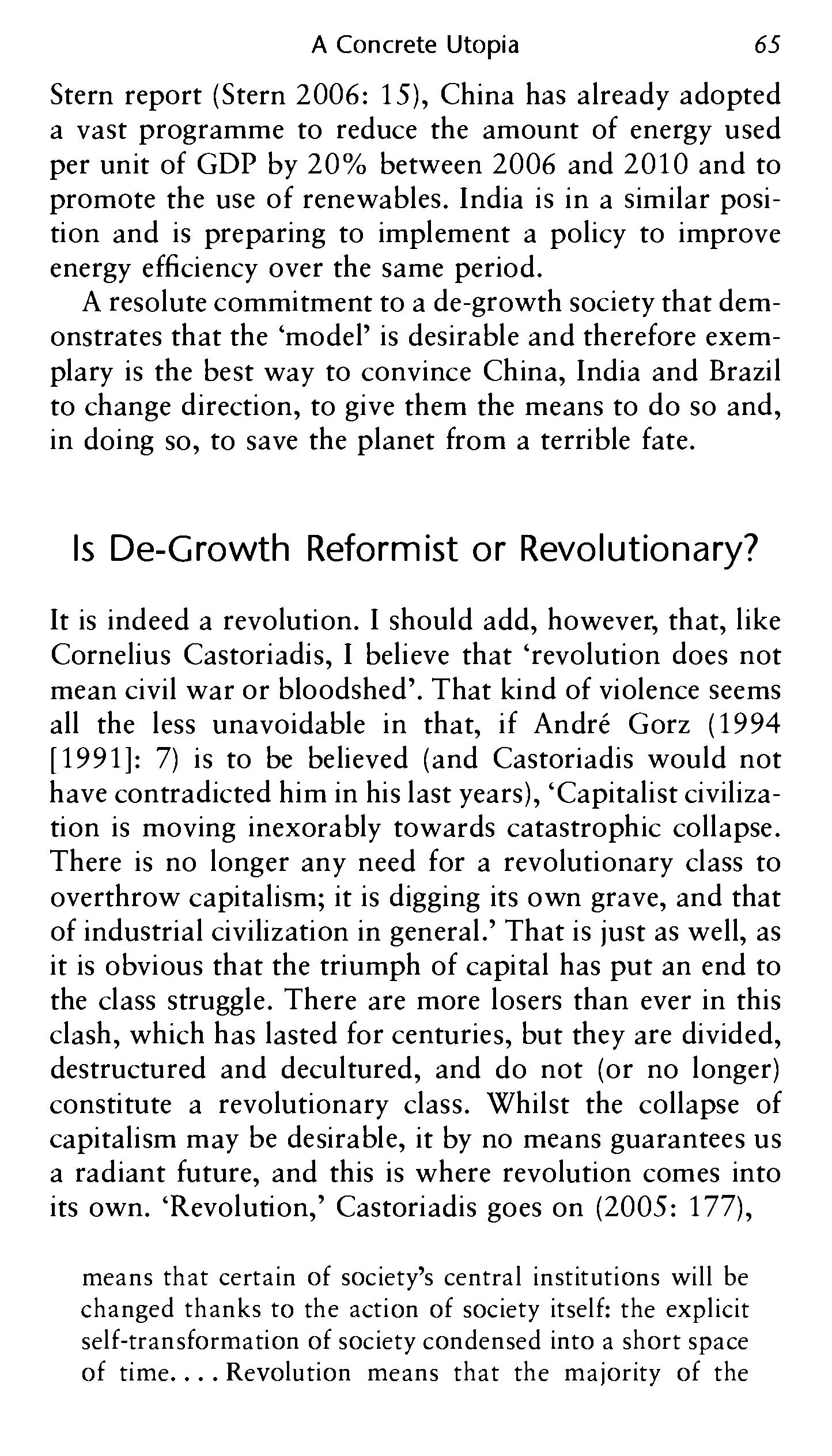
16 minute read
Is Dc-Growth Reformist or Revolutionary?
Stern report (Stern 2006: 15), China has already adopted a vast programme to reduce the amount of energy used per unit of GDP by 20% between 2006 and 2010 and to promote the use of renewables. India is in a similar posi- tion and is preparing to implement a policy to improve energy efficiency over the same period.
A resolute commitment to a de-growth society that dem- onstrates that the 'model' is desirable and therefore exem- plary is the best way to convince China, India and Brazil to change direction, to give them the means to do so and, in doing so, to save the planet from a terrible fate.
Is De-Growth Reformist or Revolutionary?
It is indeed a revolution. I should add, howevei that, like Cornelius Castoriadis, I believe that 'revolution does not mean civil war or bloodshed'. That kind of violence seems all the less unavoidable in that, if André Gorz (1994 [1991]: 7) is to be believed (and Castoriadis would not have contradicted him in his last years), 'Capitalist civiliza- tion is moving inexorably towards catastrophic collapse. There is no longer any need for a revolutionary class to overthrow capitalism; it is digging its own grave, and that of industrial civilization in general.' That is just as well, as it is obvious that the triumph of capital has put an end to the class struggle. There are more losers than ever in this clash, which has lasted for centuries, but they are divided, destructured and decultured, and do not (or no longer) constitute a revolutionary class. Whilst the collapse of capitalism may be desirable, it by no means guarantees us a radiant future, and this is where revolution comes into its own. 'Revolution,' Castoriadis goes on (2005: 177),
means that certain of society's central institutions will be changed thanks to the action of society itself: the explicit self-transformation of society condensed into a short space of time. . . . Revolution means that the majority of the
66
A Concrete Utopia community enters a phase of political activity, or in other words instituting activity. The social imaginary gets to work and explicitly sets about transforming existing institutions.
In that sense, the de-growth society project is eminently revolutionary. We are taking about cultural change, as well as changes in the legal structure and relations of pro- duction. Whilst this is a political project, its implementa- tion has more to do with an ethics of responsibility than with an ethics of conviction. Politics is not ethics, and politicians have to come to terms with the existence of evil. The quest for the common good is not a quest for the Good, but a quest for the lesser of two evils. And yet political realism does not mean surrendering to the banal- ity of evil; it means containing evil within the bounds of the common good. In that sense, even radical and revolu- tionary politics can only be reformist, and must be reform- ist if it is not to drift into terrorism. The need for pragmatism in political action, which will be discussed in chapter 3, does not mean that we have to abandon the goals of our concrete utopia. Its revolutionary potential, and what José Boyé (2007) aptly calls its fertility, are not incompatible with political reformism, provided that the inevitable compromises that have to be made at the practi- cal level do not degenerate into compromises at the intel- lectual level.
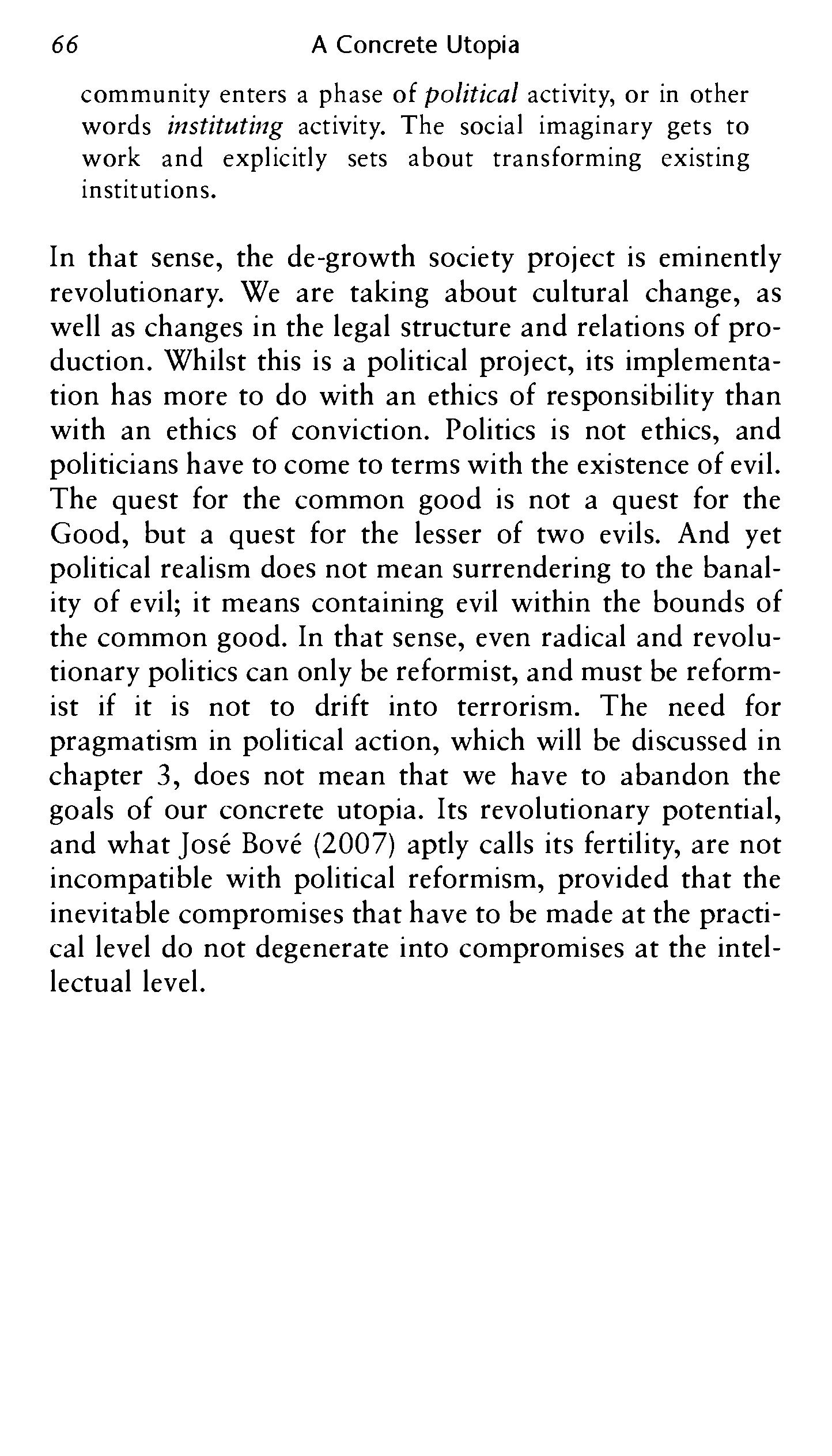
-3-
A Political Programme
All those on the left who refuse to approach the question of growth without fairness in this way demonstrate that socialism is, in their view, nothing more than a continuation by other means of capitalist social relations and capitalist civilization, and of the bourgeois way of life and model of consumption.
(Gorz 1977)

Designing a coherent and desirable model for a de-growth society is not only a theoretical exercise but also a major step towards its politica! implementation. We have to further elaborate these concrete proposals, even though the in-depth self-transformation of society and its citizens seems to me to be more important than the outcome of any election. This does not necessarily mean that its birth will be spontaneous and painless. Politicians are now so concerned with mere politicking that they have little under- standing of the realities that have to be changed and they cannot be trusted. That does not mean that there are no such things as electoral issues. In the best of cases, govern- ments that wish to swim against the tide can do no more than decelerate, slow down and soften processes that are beyond their control. There is such a thing as a global
68
A Political Programme 'cosmocracy' which, without taking any explicit decisions, is draining politics of its substance and imposing 'its' will through the 'dictatorship of the financial markets' (Duclos 1997). All governments are, whether they like it or not, capital's 'functionaries'.
The alternative to productivism exists at every level: individual, local, regional, national and global (special attention must be paid to the European level). But as the tyranny of the 'new masters of the universe' prefers to work at the higher levels, we must find the most pertinent levers if we are to be able to work in a concerted and complementary fashion.
Does the 'de-growth party' have an electoral pro- gramme? Is de-growth soluble in capitalism? Does the demand for it come from the right or from the left? Will the de-growth movement lead to the emergence of a new political programme? We will now try to answer these political questions.
An Electoral Programme

The virtuous circle of dc-growth could be triggered by some very simple and apparently almost trivial measures.' The transition to a dc-growth society can be described in a quasi-electoral programme that summarizes in a few points the 'common sense' implications of the above diagnosis.
For example:
1. Get back to an ecological footprint equal to or smaller than a planet, or in other words, other things being equal, to a material output equivalent to that of 1960-70.
These do not preclude other public health measures, such as the intro- duction of a minimum wage, which has been proposed by MAUSS, or Jean-Paul Berlan's suggestion that all patents should simply be done away with. [MAUSS = Mouvement Anti-Utilitariste en Sciences Sociales (Anti-Utilitarian Movement in the Social Sciences) (Translator).]
How is it possible to reduce our ecological footprint by about 75% without going back to the Stone Age? Quite simply by making massive cuts in 'intermediate consump- tion', understood in the broad sense (transport, energy, packaging, advertising) without reducing the amount we ultimately consume. Getting back to the local level and eliminating waste would help.
Using the appropriate eco-taxes to include transport costs in the pollution caused by this activity.
The a minima external costs that are not borne by motorists reportedly amount to over 25 million euros per year in France, or to more than current domestic taxes on oil products (TIPP: Taxe Intérieure sur les Produits Pétroliers) (Rotillon 2006).
Relocalize activities. Given their harmful impact on the environment, we have to question the need to transport large numbers of people and large quantities of commodi- ties around the world.
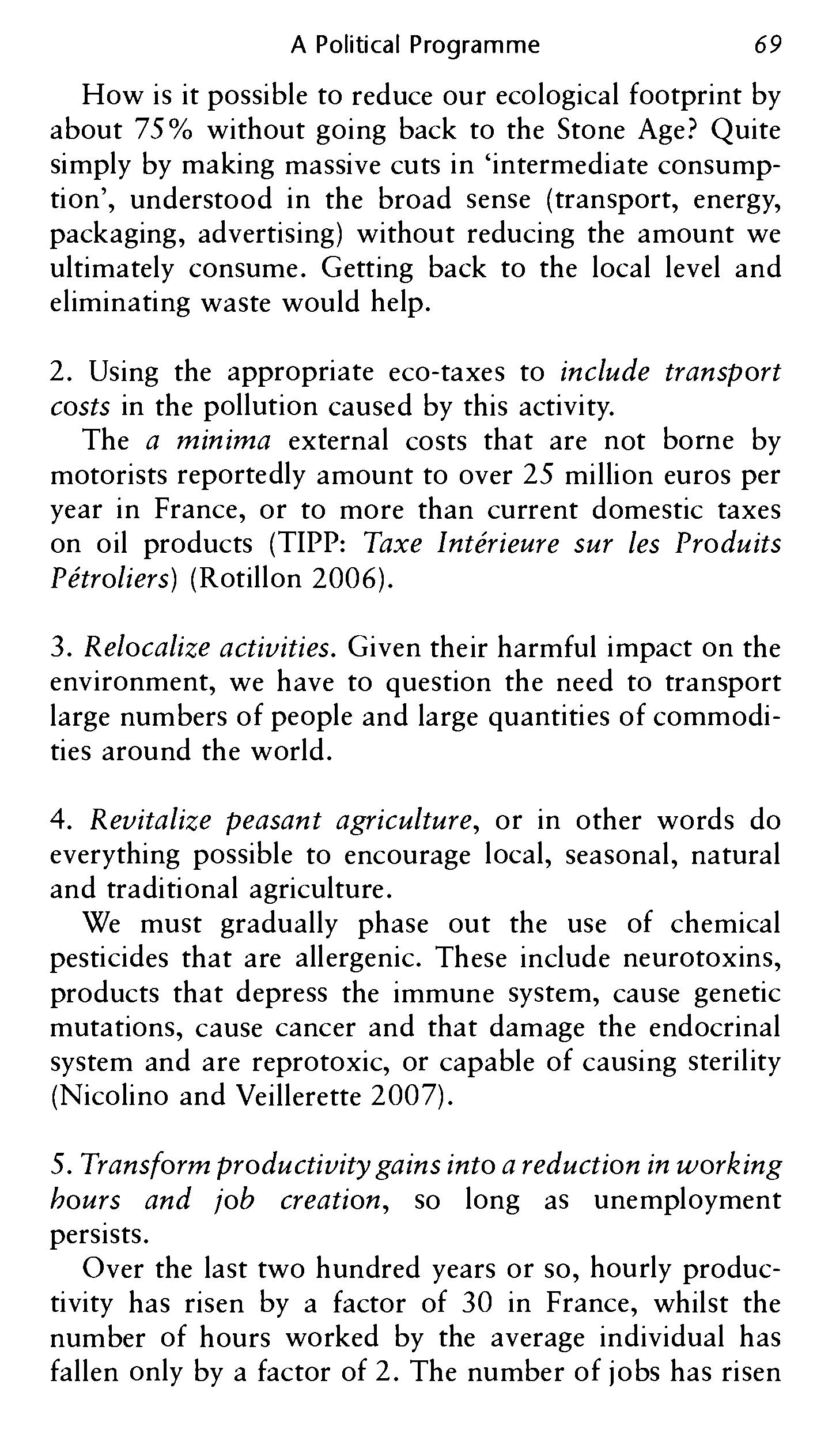
Revitalize peasant agriculture, or in other words do
everything possible to encourage local, seasonal, natural and traditional agriculture.
We must gradually phase out the use of chemical pesticides that are allergenic. These include neurotoxins, products that depress the immune system, cause genetic mutations, cause cancer and that damage the endocrinal system and are reprotoxic, or capable of causing sterility (Nicolino and Veillerette 2007).
Transform productivity gains into a reduction in working hours and job creation, so long as unemployment
persists.
Over the last two hundred years or so, hourly produc- tivity has risen by a factor of 30 in France, whilst the number of hours worked by the average individual has fallen only by a factor of 2. The number of jobs has risen
70
A Political Programme by a factor of 1.75, whilst production has risen by a factor of 26 (Marchand and Thélot 1977, cited Paquot 2006). We must invert our priorities thanks to job-sharing and an increase in leisure time.
6. Encourage the 'production' of relational goods, such as friendship and neighbourliness; my consumption of such goods does not reduce the available stock. On the contrary. 'Intellectual exchanges are basically different from commodity exchanges,' explains Bernard Maris (2006: 182).
In an intellectual exchange, the giver does not lose any- thing and the receiver takes without dispossessing his or her interlocutor of anything. Knowledge, skills and art can therefore be shared and 'consumed' by everyone. Pythagoras's theorem is used by millions of individuals and applied to thousands of functions without anyone being deprived of it. Knowledge is a collective good, a fountain of youth from which we can all drink without causing others the least frustration.
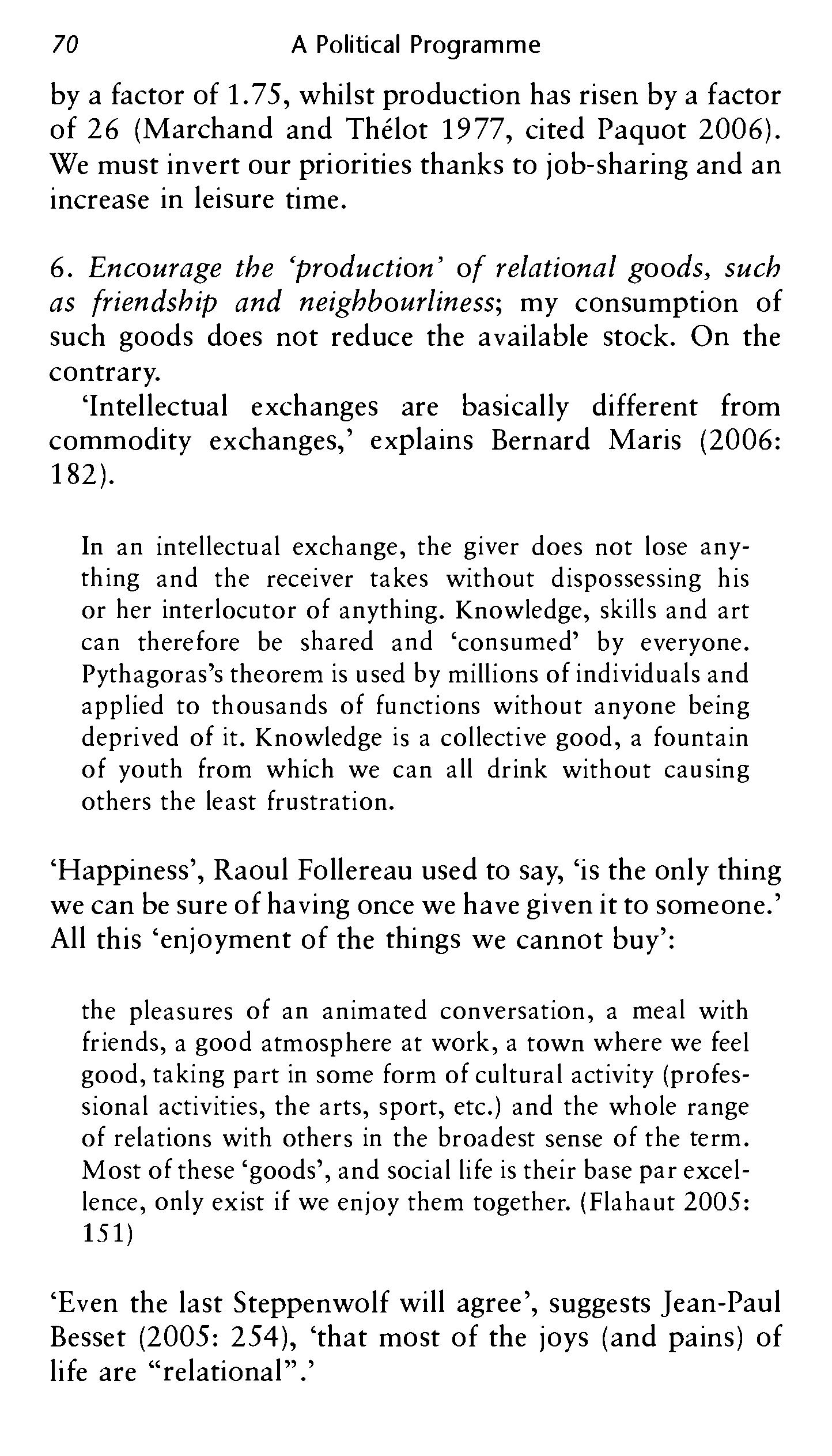
'Happiness', Raoul Follereau used to say, 'is the only thing we can be sure of having once we have given it to someone.' All this 'enjoyment of the things we cannot buy':
the pleasures of an animated conversation, a meal with friends, a good atmosphere at work, a town where we feel good, taking part in some form of cultural activity (profes- sional activities, the arts, sport, etc.) and the whole range of relations with others in the broadest sense of the term. Most of these 'goods', and social life is their base par excel- lence, only exist if we enjoy them together. (Flahaut 2005: 151)
Cut energy wastage by a factor of 4 in accordance with the studies undertaken by the négaWatt association.2
Heavy penalties for spending on advertising.
One might even adopt Nicolas Hulot's proposal as it stands:
We have to look into the possibility of gradually introduc- ing a complete ban on advertising in programmes aimed at children, and especially on adverts for products that are injurious to their health. The goal here is to restrict the extent to which viewers are conditioned to advertising at an age when they do not have the critical distance that is needed to resist its seductions. (Hulot 2006: 2S4)
Declare a moratorium on technoscientific innovation, make a serious assessment of the situation and redirect scientific and technological research on the basis of new aspirations.4
We could, for example, develop 'green chemistry' rather than toxic molecules, environmental medicine rather than concentrating on genetics alone, and encourage research into agro-biology and agro-economics rather than into agro-industry (GM crops and other living pipe-dreams).
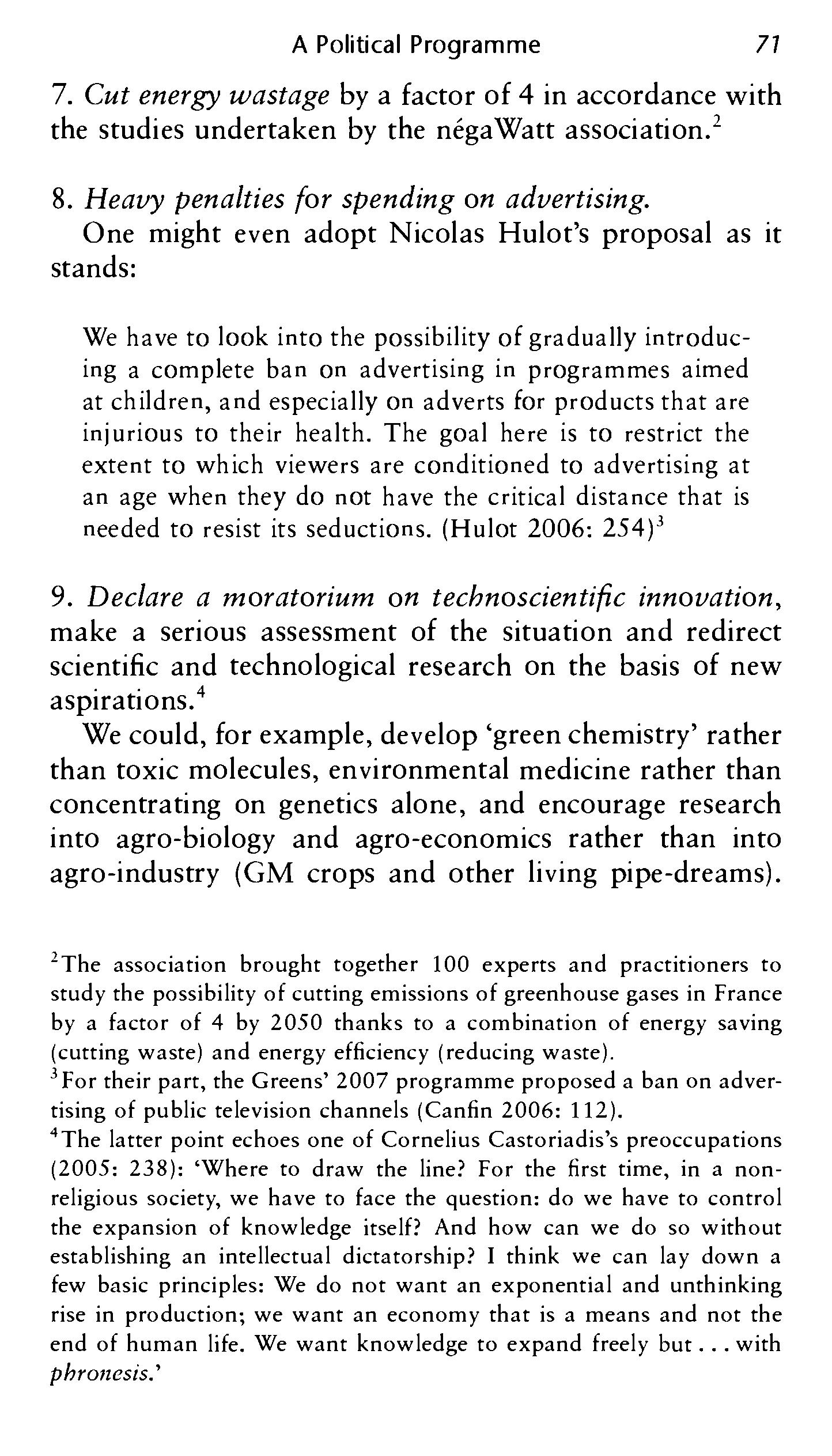
2The association brought together loo experts and practitioners to study the possibility of cutting emissions of greenhouse gases in France by a factor of 4 by 2050 thanks to a combination of energy saving (cutting waste) and energy efficiency (reducing waste). 3For their part, the Greens' 2007 programme proposed a ban on adver- tising of public television channels (Canfin 2006: 112). 4The latter point echoes one of Cornelius Castoriadis's preoccupations (2005: 238): 'Where to draw the line? For the first time, in a non- religious society, we have to face the question: do we have to control the expansion of knowledge itself? And how can we do so without establishing an intellectual dictatorship? I think we can lay down a few basic principles: We do not want an exponential and unthinking rise in production; we want an economy that is a means and not the end of human life. We want knowledge to expand freely but. . . with phronesis.'
72
A Political Programme The moratorium should be extended to include big infra- structural projects (ITER, motorways, high-speed trains, incinerators, etc.).5
This platform, which was first outlined in an article published in Le Monde diplomatique in 2004, has a lot in common with subsequent proposals such as Nicolas Hulot's ecological contract and the 164 proposals put forward in the Appel de Paris (cf. Belpomme 2007). In both cases, we have a diagnosis of the threats and a pre- scription for a cure similar to my own, together with a wealth of information and details of concrete measures that are beyond our limited resources, and that in itself is cause for celebration. All this concurs with or comple- ments most of the measures recommended by the ecolo- gists: taxes upon machinery, the removal of taxes on work, land reform (creating new peasants) and efforts to encour- age energy saving and cutting the consumption of natural resources.6 Other possible measures include using high VAT-style taxes on the consumption of products whose relative prices continue to fall to finance a 'selected working hours' policy.
At the global level, we could adopt all these measures, and especially the fiscal measures proposed by Attac (Asso- ciation for the Taxation of Financial Transactions to Aid Citizens) (2006):

a tax on financial transactions: 'Introduce a tax on currency transactions and share dealing'; an additional unitary tax on the profits of transnational firms to restrict tax dumping;
5'It is imperative to establish an immediate moratorium on the building of new incinerators and the issue of new licences for coincineration' (Appel de Paris, cited Belpomme 2007: 257). [ITER is a joint interna- tional research and development project that aims to demonstrate the scientific and technical feasibility of fusion power (Translator).] 6See Fabrice Flipo's reply to Isaac Johsua: http://decroissance.frec.fr/ Rcponsc-Isaacjohsua.rtf.
a global wealth tax: do away with tax havens and bank confidentiality; a tax on carbon emissions; a tax on highly active nuclear waste with a very long life.
To turn to the protection of the environment, global measures are unavoidable because pollution does not recognize frontiers. The problem of implementation is even more complex at this level, as action is for the moment taken, either directly or indirectly, at the state level.
This programme is centred on the internalization of external diseconomies (the damage caused by agents who leave the community to pick up the bill). All ecological and social dysfunctionalities - from road accidents to spending on anti-stress drugs - should and must be paid for by those who cause them. Eco-taxes are one way of making them do so. The three things that drive people to crime, denounced in chapter 1 - advertising, built-in obsolescence and credit - can be regarded as the growth society's nega- tive externalities. Whilst their harmful effects cannot be measured, taxes and controls will make it possible to lessen their impact. This policy will have two effects: it will gradually reduce our ecological footprint, and it will give the community precious resources that will allow it to absorb their impact, to make the necessary investment in recycling, and to counter the inevitable dysfunctionalities caused by the current state of affairs. More could be done to improve public transport, for example, and to help the poorest members of society by imposing heavy tax increases on private transport.
Just imagine the environmental impact of internalizing the cost of spending on transport and health, or the impact that making firms pay for education, security and unem- ployment would have on the workings of our societies! In principle, these 'reformist' measures are in line with ortho- dox economic theory, as the liberal economist Cecil Pigou
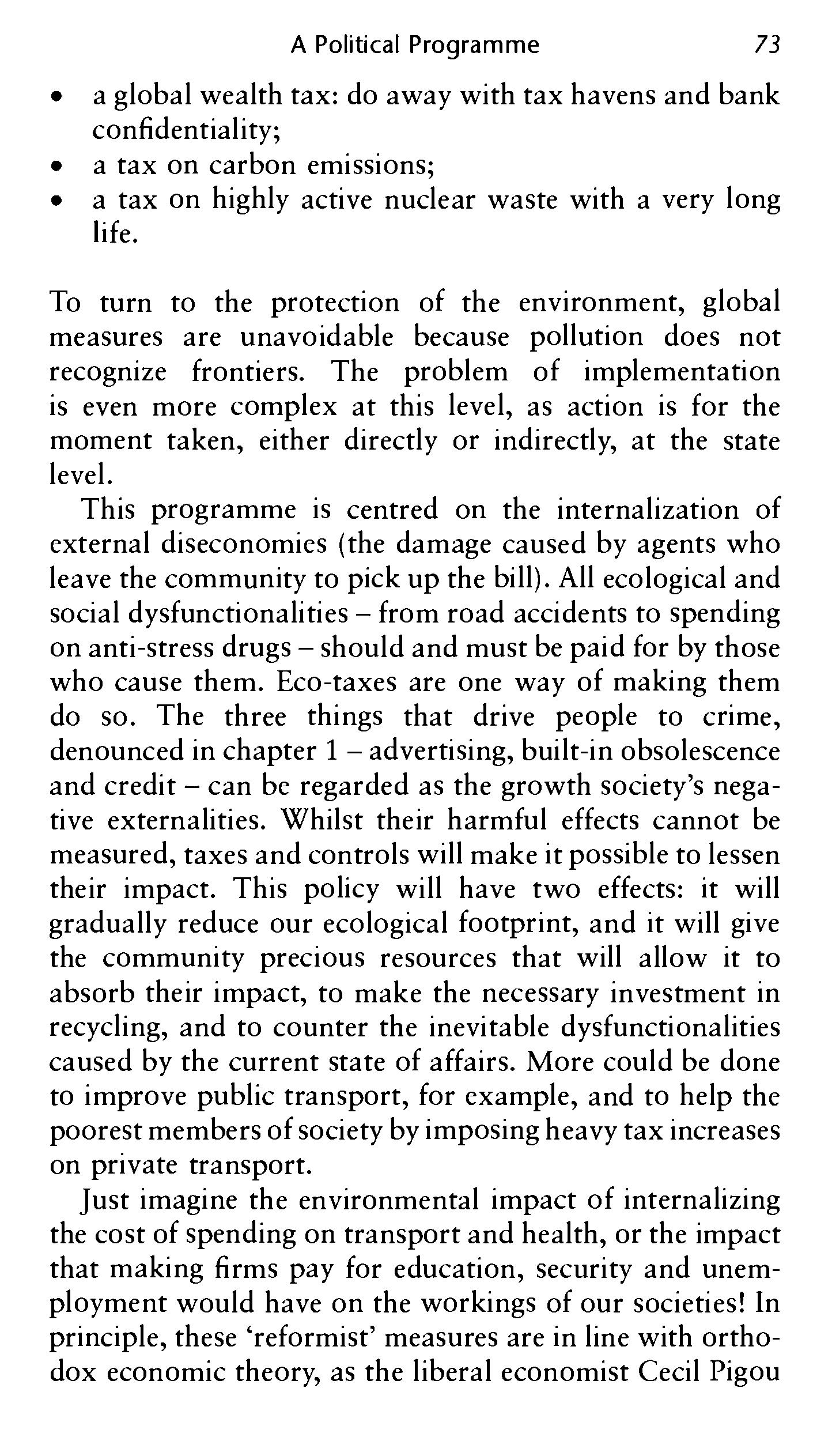
74
A Political Programme demonstrated in the early twentieth century.7 Pigou dem- onstrated that, in order to achieve the best results (the greatest possible well-being for all consumers and produc- ers), a system of taxes or subsidies must be used to correct prices. Taxes should ensure that the polluters bear the cost of the harmful external effects they have on their neigh- bours, and subsidies should be used to reward the produc- ers of positive external effects. This was intended to encourage agents to take into account the social effects of their private decisions and to modify them accordingly. The principle of 'polluter pays' was born. 'It becomes pos- sible to make private interests and the social (or general) interest to coincide without altering the actual mechanism of the market (which is something restrictive regulations cannot do) and simply by using a system of taxes to correct it' (Clerc 2006: 15). Nicolas Hulot's ecological pact is based upon the same principle. The difference is that, if these measures were taken to their ultimate conclusion, they would bring about a real revolution and would allow almost the entire programme for a de-growth society to be implemented. Firms that acted in accordance with the logic of capitalism would of course be discouraged and many activities would no longer be 'profitable'; the system would come to a halt. If, according to the International Center for Technological Assessment, invisible fuel costs were included - car accidents, air pollution, the cost of main- taining military bases to prevent the peoples of producer countries taking control of their own oil, subsidies to oil companies - the cost of petrol would soar from $1 a gallon to $14 (Sierra Magazine, MarchApril 2002: 15, cited Rasmussen 2004). With prices like that, civil aviation would come to a halt and there would probably not be many cars on the road.
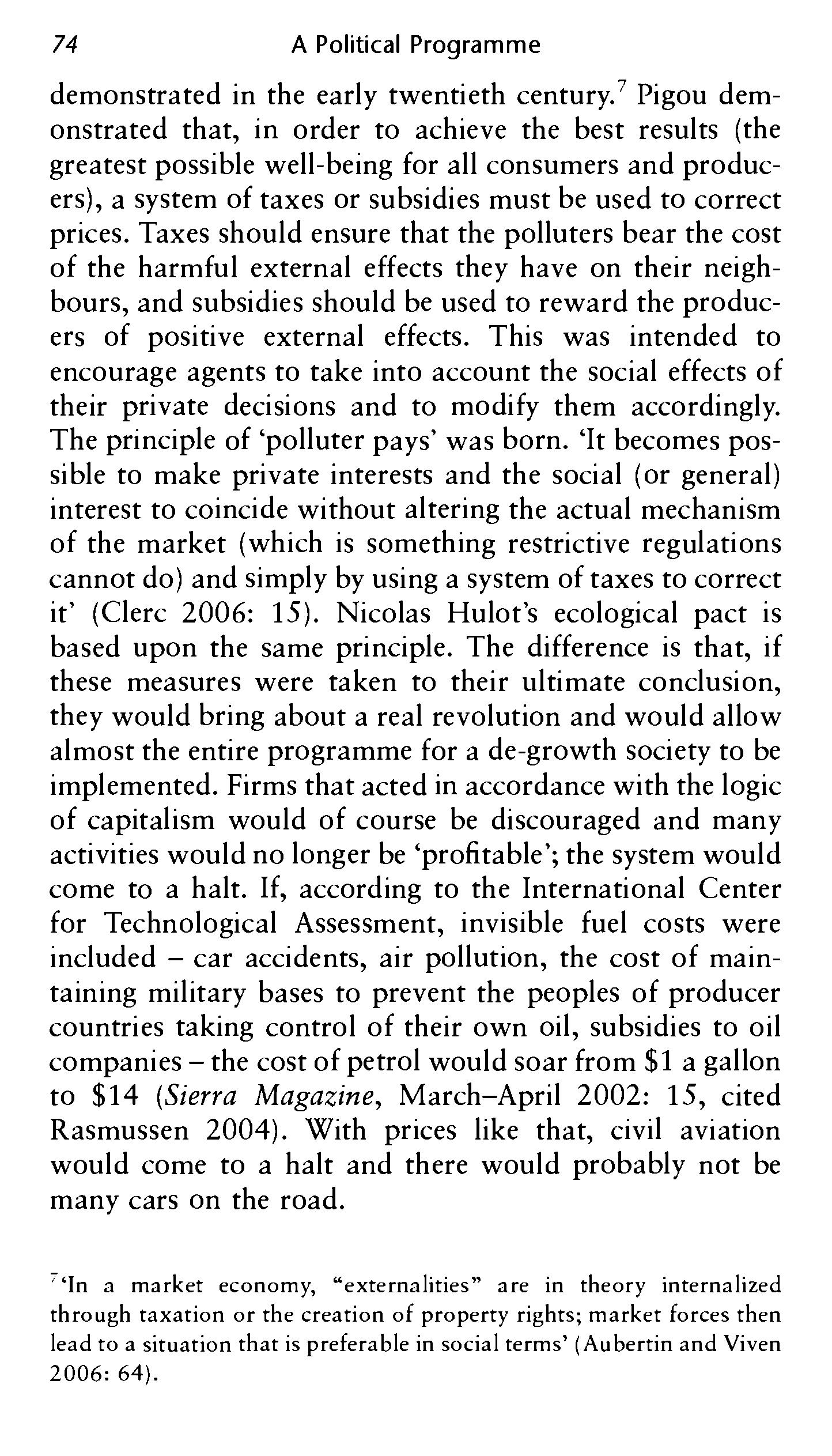
7'In a market economy, "externalities" are in theory internalized through taxation or the creation of property rights; market forces then lead to a situation that is preferable in social terms' (Aubertin and Viven
Forcing firms to pay the full cost of the damage and risks they inflict on society would be another way of inter- nalizing the negative externalities generated by the system. We already know that no insurance company is prepared to cover the risks inherent in the nuclear industry, climate change, GM crops or nanotechnologies.8 One can imagine the paralysis that would result from compelling them to cover health risks, social risks (unemployment) or even aesthetic risks.
Any politician who proposed such a programme and implemented it when elected would be killed before the week was out. In December 1972, President Salvador Allende made an unusually lucid speech to the UN (Allende 1973). A few months later, he was assassinated because he had implemented a policy that was much less subver- sive than that outlined here. His explanation is more rel- evant than ever. He likened the tragedy of his country to that of a silent Vietnam. There were no troops occupying the country, and there were no planes flying over Chile. The country was, however, facing an economic blockade and had been denied credit by international financiers. It was facing a real battle between the multinationals and between states. States were no longer in control of their basic political, economic and military decisions because of the multinationals, which were not dependent on any state. They operated without taking any responsibility for their actions and were not controlled by any parliament or by any agency that represented the general interest. The political structure of the world had, in a word, been turned upside down. The big multinational companies were damaging the interests of the developing countries. Their oppressive and uncontrolled activities were also damaging the industrialized countries where they were based. And no one was even talking about 'globalization' in 1972.
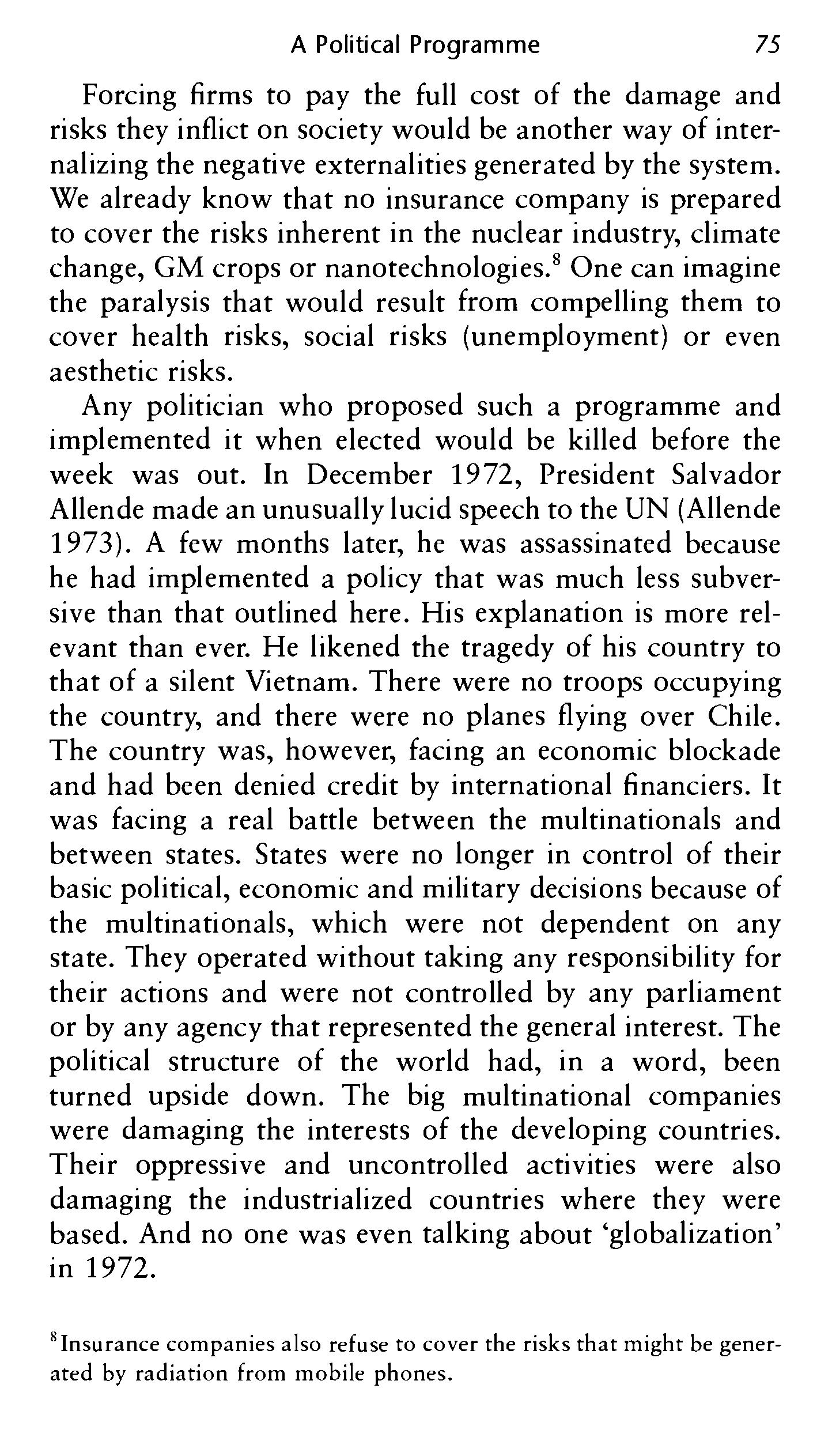
8lnsurance companies also refuse to cover the risks that might be gener- ated by radiation from mobile phones.






